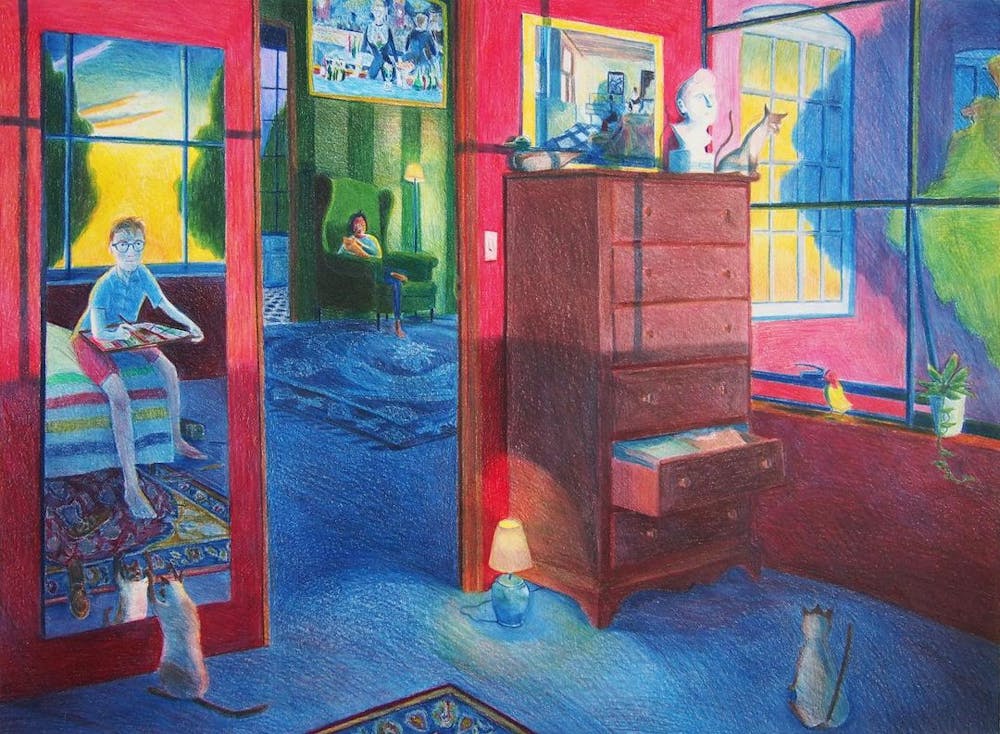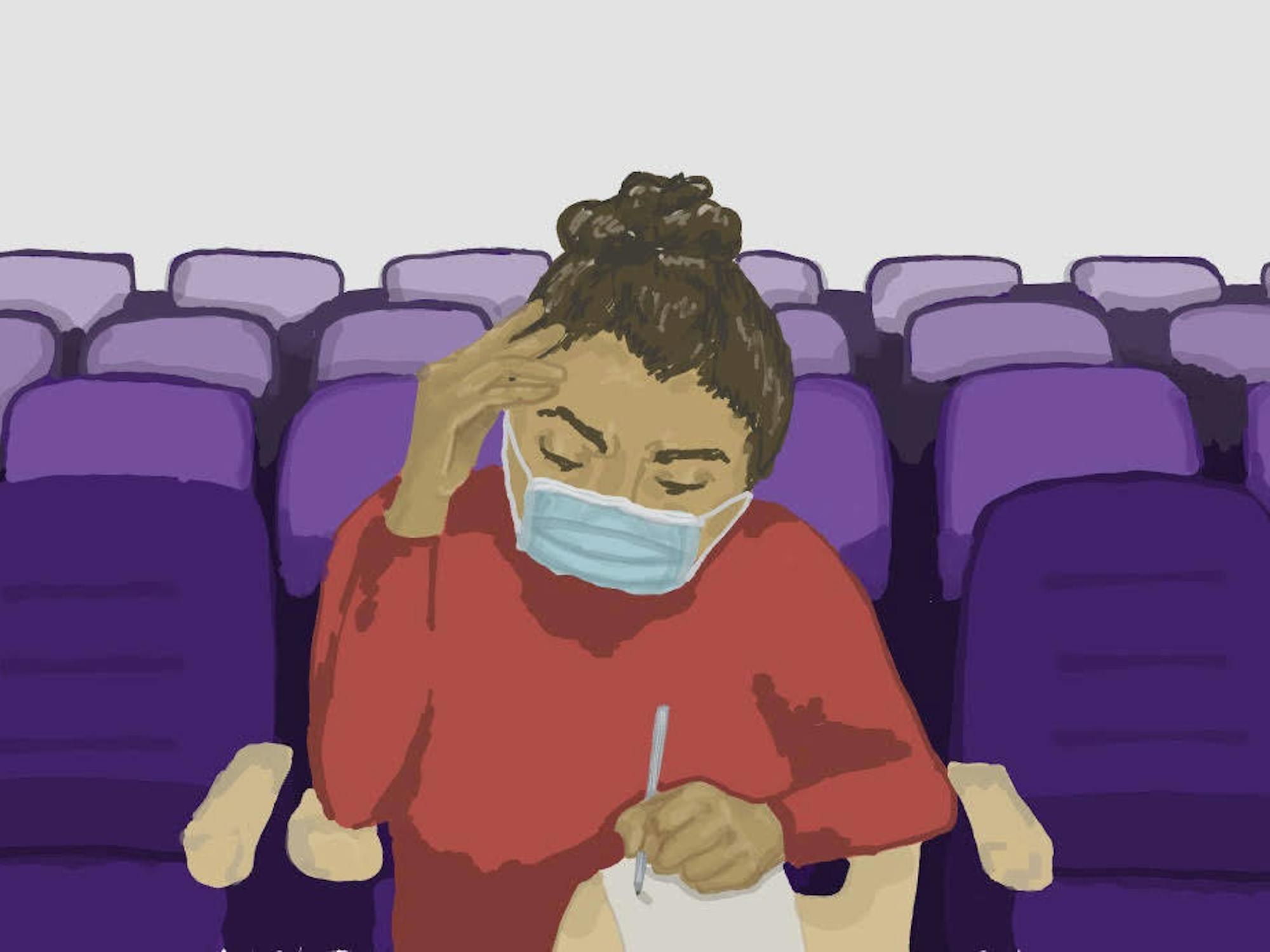Brown’s annual Family Weekend is an opportunity to give parents “a small taste of the intellectual and cultural vitality of [their] student’s home away from home.”
I open my eyes groggily and see my parents sprawled out beside me—it’s Saturday of Brown’s Family Weekend, but I’m not at Brown. I’m on the white duvet of my parents’ hotel room bed, the Omni Providence bathrobe laid atop my legs for warmth. My eyes are puffy from crying—exuding “cultural vitality.”
In my head, it would be perfect. A clean room, a football game. A bright-eyed, perfectly adjusted college freshman escorting her parents through her new world. I would have all my homework done; they would be impressed by my time management, my exemplary hospitality skills. They would go home and say that parents’ weekend was perfect, because Ellyse, as always, is perfect.
The days before their arrival were meticulously designed. On Thursday night, the night before their arrival, I would get into bed having completed three midterm essays, 10 days in advance of their due dates. Then I would wake, beautiful, on Friday morning, greet my parents with a smile, and present the tenets of my new world.
In the days preceding my parents’ arrival, I wrote two paragraphs. My hands shook as I sat longingly in my dorm, yearning for the words, the knowledge to spill out of me. It didn’t. Instead, I squeezed the tiny bumps on my face until they bled. I ate five pears and then a cup of ice cream at 1:45 a.m.
I woke Friday a fraction of a human. My face was scarred, my stomach a rock, my sinuses exhausted from the lingering cold coming up on the second month of its stay. Yet I pressed makeup into my eyelids and skipped outside my door to greet my parents. Because I was perfect.
I’m sure they could see the exhaustion dripping from my face. I just didn’t want to acknowledge it, the pang in my hips from hours in my wooden chair, the way my brain pounded against my temples as if it wanted to escape its confines. I wanted to give them a “small taste” of the goodness of my life here in college—not this. They knew about the anxiety, the overwhelm, the homesickness via phone conversations, but I didn’t want them to see this in the flesh. I wanted them to know that they did a good job, that I was coping. I didn’t want them to go home with worry lingering in their chests.
Saturday came and I couldn’t suppress my nasty cough or my debilitating fatigue any longer. I walked into Walmart with my mom, and it felt as if the world was spinning. I was manic; my mind was on fire and the task of deciphering different laundry detergent brands only provoked its already raging flames. I tried to hide it. Maybe if I spoke enough about fabric softener, I could mask the chaos seething through my body.
I don’t remember anything from those 30 minutes spent in the supermarket. And my mom could tell, as she always can. I situated myself back into the car as normally as I could, still feeling dissociated from the very body I sought to maneuver. But I couldn’t pacify my shaking hands nor my raging thoughts, as much as I tried. My mom looked back from the passenger seat, concerned. She sees through anything with those eyes, hence my avoidance of them all morning. One glimpse into them and the floodgates opened—and the turmoil spilt out from inside me.
I told her I was anxious, that I was overwhelmed by impending midterms, that I questioned my ability to balance social and academic life, that I felt guilty for my growing disconnection from home, and my enthusiastic commitment to my new one. I told her that these anxieties compounded atop each other and multiplied to create a uniquely encumbering heaviness. I had told her this over the phone, and yet I didn’t want this nervousness to plague our Family Weekend together. After all, I was supposed to be displaying the “vitality” of my new life, not a lack thereof.
We didn’t make it to the football game. Instead, I exchanged my dress for my dad’s t-shirt and my mom’s sweatpants. I ate Chipotle and surrendered to the warmth of my mother’s arms. My parents watched me sleep for three hours, my body finally given time to stitch together the lesions it had bore for too long.
An intricately woven connection to my parents has been a constant in my life—and I am so thankful for that. All three of us cried on the first day of kindergarten—and first grade, and second grade. I probably only began sleeping in my own bed consistently at the age of nine. Their touch, their words, their mannerisms, their everyday traditions, their love were the cornerstones of my youth.
I didn’t know how these feelings of attachment would be transported along with me to Rhode Island, if the plane turbulence would provoke changes in their form and intensities. I still felt so tethered to my parents, even as I watched them drive away on the evening of move-in day. I still somehow wanted them present in the minute aspects of my life, just as they were at home. I sent them pictures of everything, from my expeditions to Wayland Square and Seekonk River, to my nights spent drunkenly smiling—and I still do.
Yet I have always struggled to tell them when life isn’t as picturesque. At home, my mom would call me a “stuffer,” encapsulating my emotions into a tupperware, hoping it didn’t burst. I feel that this becomes even more complicated when a child enters adulthood. Am I to burden my parents with problems that, due to distance, they likely cannot fully understand? Now that I am an adult, to what degree should I be relying on my parents’ advice? Will I only worry them? But how do I maintain our close relationship while also establishing healthy boundaries?
This is what I asked myself as I lay nearly lifeless in my parents’ hotel room. I knew rationally that I did not ‘fail,’ in any sense of the word. But I didn’t want my parents to question my ability to overcome adversity myself. I didn’t want them to think they didn’t prepare me well enough for the challenges I’d encounter at Brown. I didn’t want them to leave here worried for my well-being. Had I shown them too much? Will this only turn out to burden them?
The parent-child relationship can be one of the most enduring and emotionally tumultuous human connections. Ellen Galinsky, a current faculty member at Bank College in Manhattan, developed what have become known as ‘the six stages of parenthood’ in her book Between Generations. The final of these stages is called the “departure stage,” which is characterized by evaluation. Parents evaluate whether they have “achieved the parent/grown child relationship they wanted” and contemplate their successes and failures throughout the child’s life. They then envision what the future will bring, tasked to redefine what their ‘family’ will become in the wake of their child’s venture into adulthood. Yet, they straddle an obscure dichotomy, somehow offering care, guidance, and empathy without controlling or criticizing.
Before ever encountering Galinsky’s theories, I knew that entering college would naturally provoke my parents’ evaluation of me. If I did well in college, my parents would know they did a good job. They would know it was right to let me off in the world.
I kept apologizing for my display of instability, and they kept rolling their eyes. (Apology is a tool I tend to over-deploy). My parents kept saying, as they have my whole life, that they didn’t want me to be perfect. They said they knew that freshman year was tumultuous, that they wanted to care for me. They promised that this wouldn’t make them worry. I don’t know if I believe them, though. I am supposed to be able to handle this.
I have returned to campus from my inpatient stay at the Omni. I feel as if I have awoken from the dead. But, in coming back, I was lucky enough to see my friends and their parents. I saw them leaning on them, just as I had done. I saw them sacrificing everything to cherish their time with their families. They weren’t “too cool” for that. Maybe a child’s dependency on their parents doesn’t end with the transition into college. Maybe it is not the end, but just another stage.
Our parents want to help. My parents kept telling me that they were glad to be there this weekend, despite its emotional chaos. Yet it still pains me to think of them worrying, that my emotional expressions could somehow burden them. But maybe that is a flaw of my own perception.
In a survey of 14,500 U.S. college students, three in five respondents stated that their relationship with their parents has improved since beginning college. Tisha Duncan, professor at Meredith College, attributes this improvement to the “shift in how young adults view the role of the parent as one of confidant and adviser rather than authoritarian.”
Duncan describes the relationship to be far more “open, emotional, and sensitive” than it has been in past decades, which could be attributed to increased technological usage that allows parents greater access to the daily lives of their children. Kristen Gray, the associate dean for health and counseling at Hope College in Holland, Michigan, says that this parental insight can be extremely beneficial, although in moderation, especially amidst record high rates of anxiety and depression in college students. Different from ‘coddling’ a student, this support involves assisting the students in developing strategies to cope with newly arisen stressors.
After allowing my guard to fall to the ground, crying, revealing to my parents that I am imperfect, yet still capable of remaining afloat, I feel closer to them than ever. I have assimilated them into not only the joys of my new life but also the pitfalls and struggles of it. I think I need to learn that this doesn’t make me a “baby.” Maybe, crying in my parents’ hotel room allowed the depth of our relationship to transcend the distance between California and Rhode Island. Maybe it made us stronger.
My mom told me that this was the “best parents’ weekend” she could have ever asked for. I’m starting to think that it was pretty good, too.





